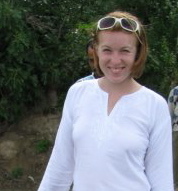The Translator Diaries is a series that looks at how current freelance translators made it into the career. In this set of interviews, we will learn what makes them so passionate about translation, how they established themselves, and what obstacles they have overcome to succeed as a translator.
Carolyn
Yohn (@untngldtransl8n) is a French and Hungarian into English translator based
in the US, specialising in legal and academic texts. She has run untangled
translations in Virginia since February 2012, having been in the industry since
2009.
At what point did you know you wanted to become a translator, Carolyn?
Becoming
a translator was just a logical extension of my interests, really. One of my
earliest memories is of flipping through a French Babar book! I began studying
languages semi-formally in elementary school through a wonderful program in my
hometown, then narrowed in on French when I was barely a teen. In high school,
just to stretch my legs a bit, I signed up for a student exchange year through
the local Rotary club. They sent me to Hungary; I did not waste the
opportunity.
 |
| Carolyn Yohn |
What relevant qualifications and experience do you have?
I ended up with a BA in French, but minored in
foreign affairs for good measure. Study abroad trips to France and Morocco,
plus a pleasure trip back to Hungary, rounded out my academic career. After
college, I took a job as an administrative assistant, which involved some
proofreading; I quickly outgrew that and found a position as a copyeditor, in
keeping with my language interests. Nights, I translated texts pro-bono through
different online portals for the experience, and I signed up for distance
courses through NYU in translation.
How did you get your first work as a translator?
My first translation job landed in my lap during
my second month of college, at an American school in southern Switzerland. A
professor was writing a book on Switzerland and the European Community; he
could read all his Italian and German sources, but he needed help with the
French. I became his research assistant for two semesters. That was really all
the taste I needed to be hooked on this profession. It was a challenging
assignment, but not impossible. I learned a lot about a topic I never would
have studied otherwise. And it made me realize there was a need for someone
with my skills. Up to that point, I really had no clue what to do with a
language degree.

How did you make the transition to freelance translation?
I quit my day job to translate full time in
August 2012. The first few months I spent completing my Certificate in Translation
and casually looking for work. It can be difficult getting steady work at
first, but diligence does pay off eventually. Now that I have more time for
sales and marketing, I am seeing great results. The best advice I have is to
choose two specialties: one you love, no matter the demand, and one you like
that people need. For me, legal translation pays my bills, and academic texts
keep my day-to-day from being monotonous. Another big thing is to join your
local translator association, if you have one. Translators are often generous,
friendly people, and they'll think of you when they are swamped by work.
Do you find that agency clients really do require 5+ years' experience,
a postgrad and half a dozen test pieces?
Agencies and individual clients don't seem
bothered that I don't have a Master’s degree. In some far-off future, I may
apply to a Hungarian university for a Master’s program, since furthering my
education in that language outside that country is basically impossible, but
it's too soon to tell.
Right
now, my portfolio of work from my pro-bono days and my résumé seem reassuring
enough for clients to hire me. I don't feel forced to accept minimum wage. I
invested quite some time in making sure my website looks professional and my
various directory listings are consistent and current. Having a listing in a
rarer language in the American Translation Association’s directory doesn't
hurt, either.
What major problems did you face and
overcome?
The biggest problem I faced in getting this far
was being patient enough. You have to invest a lot up front to have the solid
background in your languages, your writing skills, and your subject matter
necessary for producing quality translations. You also have to be patient in
seeing returns on your marketing and sales efforts. Ten emails today might
garner one response next week. Don't lose heart! One response is often all you
need, as long as you aren't undercutting the market.
Has it all been worth it?
Absolutely!
I've picked up so much since the day I decided to turn my hobby into my career.
My colleagues in the local translator association treat me as an equal, despite
age and education differences. Finding a working style that suits some of my
more personal needs, such as being able to take a day off to accommodate a
migraine, without the penalty of losing vacation time, is just icing on the
cake. I love what I do. My life is much fuller for this work. I can't wait to
see where it will take me next!







